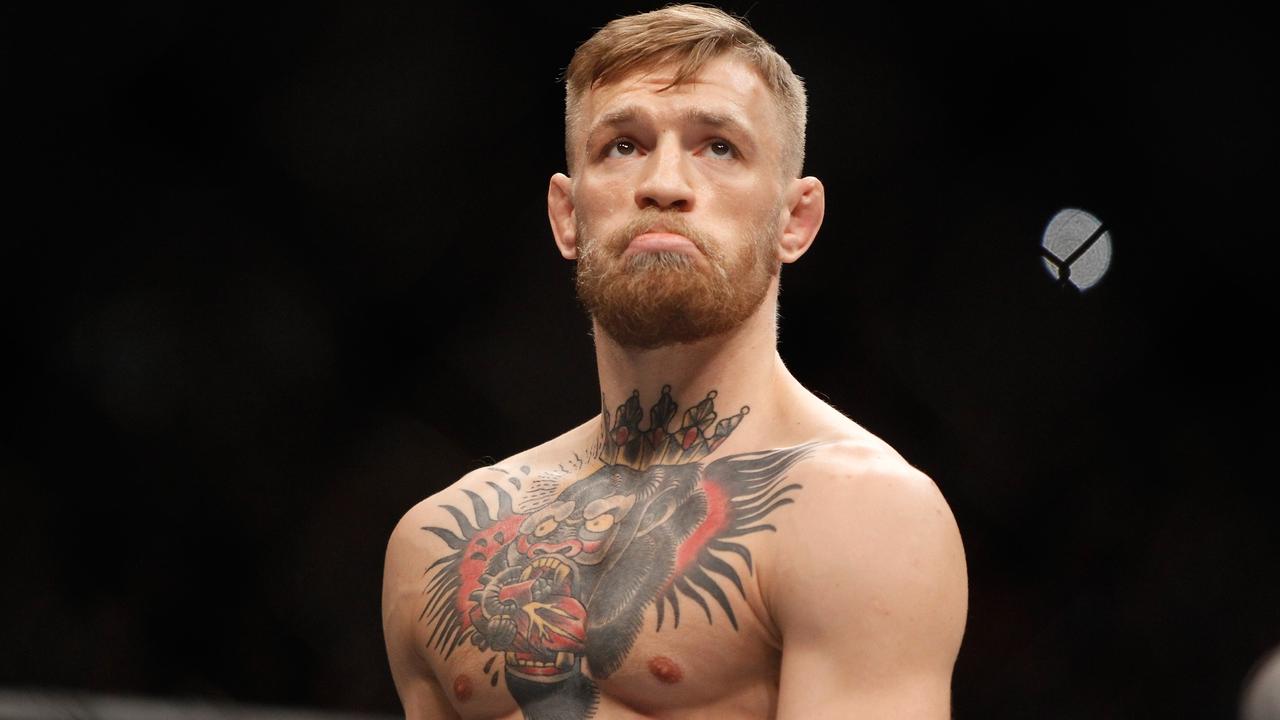When it comes to Conor McGregor, everyone’s got something to say—whether it’s about his fighting skills, his trash talk, or even his weight. Yeah, you heard that right. McGregor's weight is more than just a number on the scale—it’s a crucial factor in his MMA career. From his early days to his most iconic fights, understanding McGregor's weight can give us a clearer picture of what makes him tick in the octagon.
Now, before we dive deep into the nitty-gritty of McGregor's weight, let’s get one thing straight: this guy’s no ordinary fighter. He’s a walking legend, a self-proclaimed “Notorious” icon who’s taken the UFC by storm. His weight isn’t just about how much he weighs—it’s about how he manages it, cuts it, and uses it to his advantage. But hey, let’s not get ahead of ourselves.
In this article, we’ll break down everything you need to know about McGregor's weight. From his fighting weight to his personal stats, we’ll cover it all. So buckle up, because this is gonna be a wild ride. Trust me, by the end of this, you’ll know more about McGregor's weight than even his nutritionist does!
Here’s a quick rundown of what we’ll cover:
- McGregor's Weight Overview
- Biography and Personal Data
- How McGregor Manages His Weight
- The Science Behind Weight Cutting
- McGregor's Weight in Key Fights
- His Weight’s Impact on Performance
- Health Risks of Weight Cutting
- McGregor's Diet and Nutrition Secrets
- Training Regimen and Weight Management
- Future Plans and Weight Divisions
McGregor's Weight Overview
Alright, let’s kick things off with the basics. McGregor's weight is a hot topic in the MMA world, and for good reason. In the UFC, fighters are categorized into different weight classes, and McGregor’s journey through these classes is nothing short of fascinating. He’s fought in the featherweight, lightweight, and even welterweight divisions, showcasing his versatility and adaptability.
But what exactly is McGregor's weight? Well, it depends on the context. In his prime fighting days, McGregor typically weighed around 155 pounds (70 kg) for lightweight fights. However, outside the octagon, he’s been known to fluctuate between 170-180 pounds (77-82 kg). This fluctuation is a common occurrence for fighters who have to cut weight for competition.
Fun Fact: McGregor once claimed he could fight at welterweight (170 pounds) if he wanted to, but his body type and muscle mass make it challenging. Still, the guy’s no stranger to pushing limits!
Biography and Personal Data
Who Is Conor McGregor?
Before we dive deeper into McGregor's weight, let’s take a step back and get to know the man behind the name. Conor McGregor, born on July 4, 1988, in Dublin, Ireland, is one of the most polarizing figures in MMA history. He started his career as a humble kickboxer and quickly rose to fame in the UFC, becoming the first fighter to hold two belts simultaneously.
McGregor’s journey to the top wasn’t easy. Growing up in a working-class family, he faced his fair share of challenges. But his determination, combined with his natural talent, propelled him to greatness. And let’s not forget his infamous trash talk—McGregor’s verbal jabs are almost as legendary as his punches.
| Full Name | Conor Anthony McGregor |
|---|---|
| Date of Birth | July 4, 1988 |
| Place of Birth | Dublin, Ireland |
| Height | 5'9" (175 cm) |
| Weight (Fighting) | 155 pounds (70 kg) |
| Weight (Non-Fighting) | 170-180 pounds (77-82 kg) |
How McGregor Manages His Weight
Managing weight is a crucial aspect of McGregor's training regimen. For fighters, weight management isn’t just about looking good—it’s about performing at your best. McGregor’s approach to weight management is a mix of science, discipline, and a little bit of madness.
Here’s how he does it:
- Hydration Control: McGregor uses a combination of dehydration and rehydration techniques to make weight. This involves carefully monitoring his water intake in the days leading up to a weigh-in.
- Dietary Adjustments: His diet is meticulously planned, focusing on high-protein, low-carb meals in the weeks before a fight.
- Training Intensity: McGregor’s training camps are notoriously intense, helping him shed excess weight while maintaining muscle mass.
But it’s not all smooth sailing. Weight cutting can be brutal, and McGregor’s had his fair share of struggles. Remember his infamous weigh-in with Floyd Mayweather? Yeah, that didn’t go so well. But hey, even legends have off days.
The Science Behind Weight Cutting
Why Do Fighters Cut Weight?
Now, you might be wondering why fighters like McGregor go through the hassle of cutting weight. The answer lies in the science of weight classes. By competing in a lower weight class, fighters can face opponents who are smaller and lighter than them, giving them a potential advantage in the octagon.
Weight cutting involves a combination of dehydration, calorie restriction, and intense exercise. While it can provide a competitive edge, it also comes with risks. Fighters who cut weight too aggressively can compromise their performance and health. That’s why McGregor’s team is always careful to strike the right balance.
McGregor's Weight in Key Fights
Let’s take a trip down memory lane and look at McGregor's weight in some of his most iconic fights:
- Nate Diaz (UFC 196): McGregor weighed in at 170 pounds, marking his first venture into the welterweight division.
- Eddie Alvarez (UFC 205): Fighting at lightweight, McGregor weighed in at 155 pounds, showcasing his versatility.
- Floyd Mayweather (Boxing Match): McGregor weighed in at 148 pounds, lighter than his usual fighting weight, proving his adaptability.
Each of these fights highlights McGregor's ability to adjust his weight to suit the demands of the matchup. It’s no wonder he’s considered one of the greatest fighters of all time.
His Weight’s Impact on Performance
McGregor's weight plays a significant role in his performance inside the octagon. When he’s at his optimal fighting weight, he’s a force to be reckoned with. His speed, power, and endurance are all enhanced by his meticulous weight management.
However, cutting weight too aggressively can have the opposite effect. Fighters who push their bodies too far can experience fatigue, muscle cramps, and even dehydration during a fight. McGregor’s team is always mindful of these risks, ensuring he’s in peak condition for every matchup.
Health Risks of Weight Cutting
While weight cutting can provide a competitive advantage, it’s not without its risks. Dehydration, electrolyte imbalances, and muscle loss are just a few of the potential health issues fighters like McGregor face. That’s why proper planning and medical supervision are crucial.
McGregor’s team works closely with nutritionists and doctors to minimize these risks. They use cutting-edge technology and techniques to ensure he’s in the best possible shape for every fight.
McGregor's Diet and Nutrition Secrets
What does McGregor eat to maintain his weight? His diet is a carefully balanced mix of proteins, carbs, and fats. Here’s a glimpse into his meal plan:
- Protein Powerhouse: Chicken, fish, and eggs are staples in McGregor’s diet.
- Carb Control: Sweet potatoes, rice, and quinoa provide the necessary carbs for energy.
- Healthy Fats: Avocados, nuts, and olive oil are included to support overall health.
McGregor’s nutritionist tailors his diet to his specific needs, ensuring he’s fueled for both training and competition.
Training Regimen and Weight Management
McGregor’s training regimen is as intense as it gets. From early morning runs to grueling gym sessions, he leaves no stone unturned in his quest for greatness. Here’s a breakdown of his training routine:
- Strength Training: Focuses on building muscle and power.
- Cardio: Helps with endurance and weight management.
- MMA Drills: Simulates fight scenarios to improve technique and strategy.
McGregor’s dedication to his craft is evident in every aspect of his training. And let’s not forget his famous "Notorious" gym, where he hones his skills and prepares for battle.
Future Plans and Weight Divisions
What’s next for McGregor? While he’s hinted at a return to the lightweight division, nothing’s set in stone. One thing’s for sure—McGregor’s not done yet. Whether he chooses to stick to lightweight or venture into welterweight, his weight management strategies will continue to play a key role in his success.
As for his future opponents, the MMA world is watching closely. Who will be the next fighter to step into the octagon with McGregor? Only time will tell.
Conclusion
So there you have it—the ultimate guide to McGregor's weight. From his fighting stats to his personal data, we’ve covered it all. McGregor’s weight is more than just a number—it’s a testament to his dedication, discipline, and drive.
If you’ve made it this far, congrats! You’re now an expert on McGregor's weight. But don’t stop here. Share this article with your friends, leave a comment, or check out our other articles for more MMA goodness.
Remember, whether you’re a fan of McGregor or not, there’s no denying his impact on the sport. And as long as he’s in the game, his weight will remain a topic of discussion. So keep an eye out for his next move—you never know what he’s got up his sleeve!


